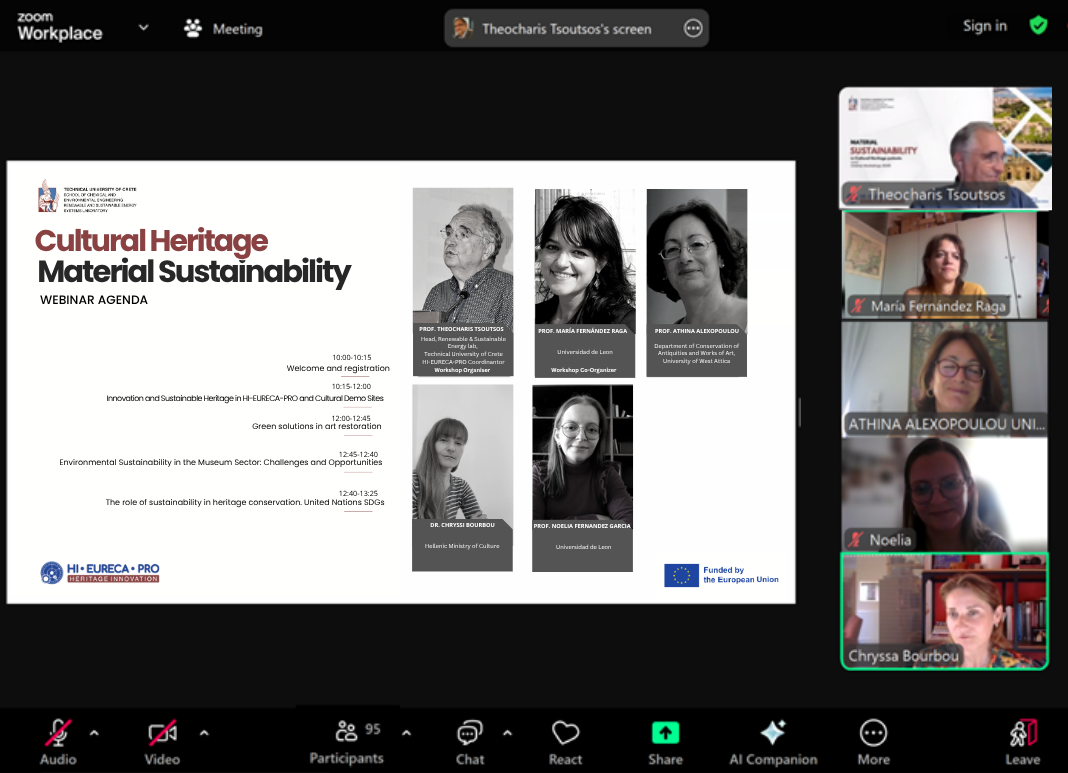Workshop: Material Sustainability in Cultural Heritage Patents
July 11, 2025
On Friday, July 11, 2025, a successful webinar on Material Sustainability and Cultural Heritage was held, bringing together experts from various fields to discuss innovative approaches to preserving cultural heritage in the face of climate challenges. The event was organized by the Technical University of Crete, coordinator of the HI-EURECA-PRO, Heritage Innovation project, in the context of a series of workshops focusing on “Material Sustainability in Cultural Heritage Patents”. More than 100 participants from academia, the research community, cultural heritage professionals, representatives of institutions, and, of course, the partners of the HI-EURECA-PRO project attended the seminar.
Key objective of the webinar was to perceive the challenges and opportunities related to the preservation of cultural heritage, while presenting a comprehensive sustainability methodology that encompasses environmental, social, and economic dimensions.

Prof. Theocharis Tsoutsos, Head of the Renewable & Sustainable Energy Lab, Coordinator of HI-EURECA-PRO project, inaugurated the webinar. Prof. Theocharis Tsoutsos set the stage by highlighting the critical intersection of innovation and sustainable practices in preserving cultural heritage and introduced the HI-EURECA-PRO initiative and its mission to integrate sustainability into heritage practices. In his speech, the pressing environmental challenges posing significant threats to heritage sites, such as climate change and pollution, were underscored. Exploring the role of new technologies, discussions arose on how artificial intelligence and climate-adaptive materials are increasingly being used to protect heritage sites. While these technologies offer promising solutions, he cautioned that they must be applied judiciously to preserve the integrity of the sites. In his concluding remarks, Prof. Tsoutsos outlined the Principles for Conservation, emphasizing the importance of integrating sustainability into heritage practices.
Dr. Athina Alexopoulou from the Department of Conservation of Antiquities and Works of Art at the University of West Attica presented on the transition towards green and sustainable practices in art conservation and restoration. She introduced good practices on developing cleaner, sustainable, and safer conservation solutions for artifacts. Dr. Alexopoulou stressed that adopting these practices is not merely an aspiration but a necessary shift in preserving cultural heritage. She also discussed the importance of Non-Destructive Testing (NDT) in promoting a greener future for conservation efforts.
Dr. Chryssa Bourbou an Archaeologist-Museologist, from the Ephorate of Antiquities of Chania Ministry of Culture Greece, head of the Working Group Sustainability and Climate Action of the Network of European Museum Organizations (NEMO), addressed the challenges and opportunities of environmental sustainability in the museum sector and provided examples of successful implementations and discussed how the climate crisis can serve as an opportunity for museums to transform into more sustainable institutions. She also identified key levers that can optimize the sustainable transformation of museums.
Prof. Noelia Fernandez Garcia, from the University of Leon highlighted how integrating sustainability into heritage conservation aligns with global efforts to achieve the SDGs and how the preservation of cultural heritage can ultimately be ensured for future generations.
Prof. María Fernández Raga, from the University of Leon, who contributed to the co-organization of the workshop, made key interventions and raised questions that provided valuable information throughout the discussion.
The webinar concluded with a lively discussion among participants, underscoring the urgent need for collaborative efforts to advance sustainable practices in cultural heritage.
The insights and discussions from this workshop serve as a foundational step in preparing for the two upcoming sessions, «Applications of Sustainable Materials» and “Assessing patent applications of Sustainable Materials in Cultural Heritage”, scheduled for autumn 2025 and winter 2026, respectively. These workshops will delve deeper into sustainable materials’ critical role in heritage conservation. Through a combination of practical analysis and application, participants will gain a comprehensive understanding of how to integrate these materials into their conservation efforts effectively.
